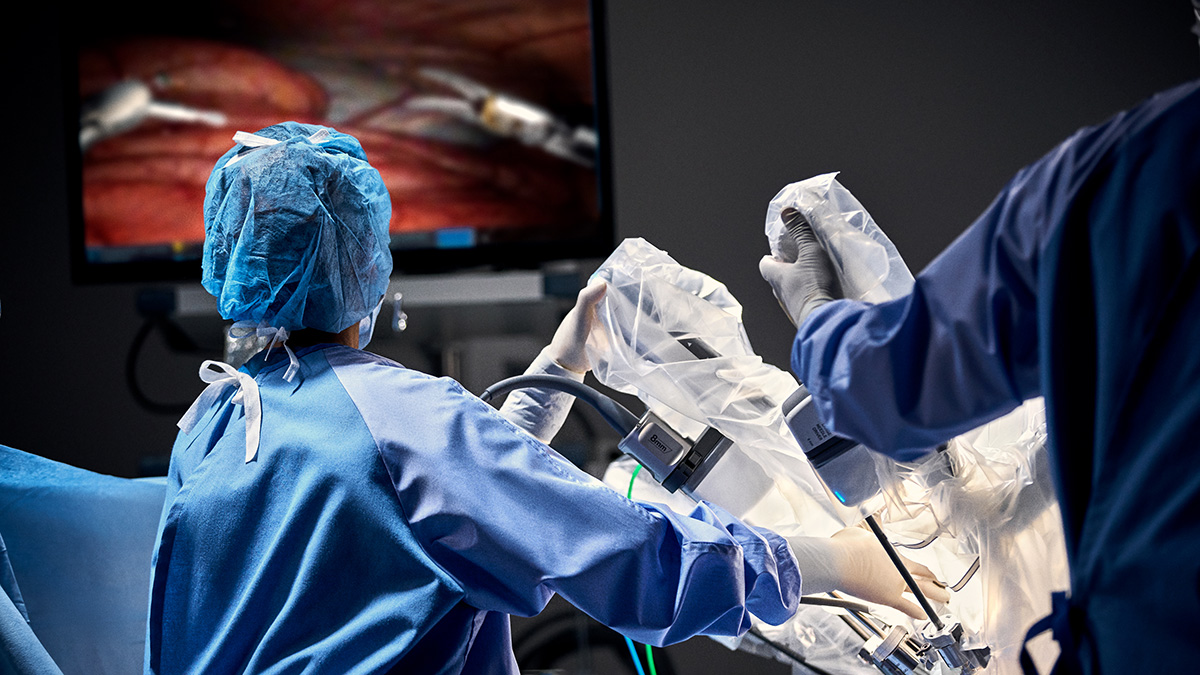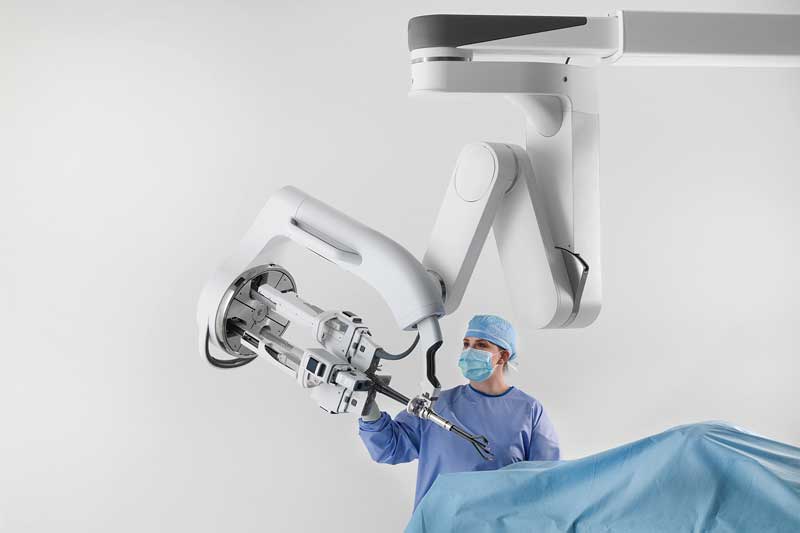Robotic surgery with a human touch
Lindsey Schutters

Photo | Intuitive
The Da Vinci Xi robotic system has put Stellenbosch University (SU) at the cutting edge of minimal access surgery in Africa. This type of surgery is performed through one or more small incisions rather than a single large one.
The operating room of the future will still include surgeons, but they will have been trained to pilot machines like the Da Vinci Xi across a range of minimally invasive procedures, within their specific discipline. The performance of the country’s first six robot-assisted total hysterectomies at Tygerberg Hospital in June 2022 constituted the first exciting step into this future.
Learning to wield a robot
Robotic surgery training is very different to regular surgical training because the manufacturers have developed specific training modules for each type of operation.
Proficiency in traditional laparoscopic procedures (which involve inserting a long, thin tube into an incision in the body so as to perform an examination or surgery) is attained in three steps: first observing procedures, then assisting in them and finally performing them. Surgeons using robotic instruments, however, must complete the full certification process associated with each individual procedure.
This process includes training on the specific type of surgery, followed by simulated operations on animal models and cadavers, and then assisting in real procedures. The final step is having a proctor assist with and oversee a certain number of surgeries to evaluate the surgeon’s mastery of the instrument for the final certification.
“Surgery is all about simulation, training and practising. Training to use a robotic instrument is no different. You can compare it to flight simulation because the shared goal between aviation and medicine is to ensure safety,” says Dr Viju Thomas, head of the Faculty of Medicine and Health Sciences’ programme in minimal access gynaecological surgery.
The Da Vinci Xi robotic system was under his control during the first of the three groundbreaking hysterectomy procedures performed at Tygerberg.
“Remember, we’re not learning a new procedure, because we are trained surgeons,” he clarifies. “We’re learning how to use the instrument to do the procedure, and making sure our support staff are also well versed in working alongside the instrument.”
Robotic surgery could potentially be performed remotely, with the surgeon operating the robot from another location. However, Thomas cautions that – while there would probably be no technical limitations such as lost data connection and high input lag – there are concerns around the patient experience.
“SU recently hosted a South African Society of Gynaecological Endoscopy congress where we did the first live surgical broadcast from Tygerberg Hospital. Doing so, we trained about 200 surgeons on laparoscopic surgery and introduced them to the concept of robotic surgery.”
Academic institutions have an important role to play in exposing surgeons to advanced techniques such as these, while demonstrating the correct ethics and principles to follow. While the high acquisition, maintenance and operational costs of the Da Vinci instrument limit its widespread use across a variety of procedures, the University is maximising its use to deliver as much value as possible to the Western Cape Health Department, its project partner.
“While we are not expecting it to dramatically affect public health in the short term, you will be surprised how high-level technology can impact primary healthcare,” says SU Dean of Medicine and Health Sciences Prof Elmi Muller.
“If you leave out advanced medicine from the healthcare ecosystem, you will soon find yourself in a position where you’ve capped what you can do for healthcare in the country. That cap results from losing high-level specialists but can also be from not keeping up with technology. Either way, your healthcare industry stagnates or moves backwards.”

Photo | Intuitive
Who reaps the benefits?
Muller also highlights the potential for these advanced technologies to drive interest and, importantly, promote intensive research. The latter aligns with the University’s goal of being the continent’s premier research-intensive institution.
While the instrument itself and the associated maintenance and training are major expenses, the benefits of using the Da Vinci Xi include shortened hospital stays (which, in turn, lowers costs) and an overall improvement in recovery times. Ultimately, it could mean better access for a wider range of patients. It is with this in mind that Muller warns against siloed thinking and encourages a more holistic view of the robotic surgery programme’s overall impact.
SU is using research on minimally invasive surgery as an opportunity for collaboration across departments with a view to engaging and developing the entire employment and skills ecosystem that supports the functioning of a robotic instrument like the Da Vinci Xi.
The University is exposing tomorrow’s medical technicians to the latest technology, which will positively impact their careers. This makes SU an attractive learning destination for global talent.
“Minimally invasive surgery techniques have an extraordinarily positive effect on patient well-being,” explains Muller. “Pain functions differently in muscle tissue than it does in skin, so reducing the size of the incision has a dramatic impact on patient comfort and has shown to reduce hospital stays as well.”
The combination of attracting highly skilled individuals and the networking effects of working with advanced technology can only increase the value of the robotic surgery programme to the University. Muller believes there is also potential for the programme to increase faculty revenue, should the University actively seek out additional funding to empower more medical professionals. Moreover, additional funding to purchase another instrument could increase the University’s research output.
With modern communication technology, it is now also possible for surgeons to receive live, on-the-job remote training from international experts.
“Surgery is a very interesting thing. Even if you’re very experienced, it’s still sometimes daunting to be in a situation on your own when you know you must approach something difficult and don’t have a senior person with you,” explains Muller.
“These operations with remote surgeons open up possibilities for people to feel supported, and it exposes them to global best practice.”